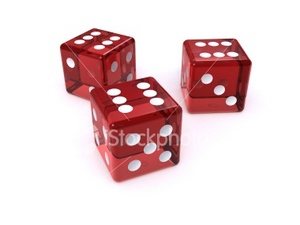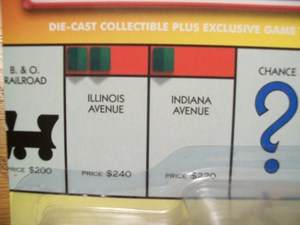The Facebook Farkle game is based on an ancient game called Farkle. Farkle is a dice game, played by rolling six dice and scoring the result. However, even though the ancient Farkle game has many variants with slightly different rules, the Facebook version matches none of them; it is its own unique variant. The most notable difference is that the Farkle Simple version of the game has become a single-player exercise in rolling the best possible score over 10 rounds. These strategies may or may not work for other variations of Farkle.
Deciding Whether to Re-Roll
At the beginning of a round, you roll 6 dice. After the initial roll, you count your scoring dice and then decide whether to roll again with the non-scoring dice. If you score is less than 300 points, then you are required to roll again by the rules; otherwise, however, this is a strategic decision. You risk losing all your points gained that round if you re-roll and get a Farkle (that is, score nothing)!
If you have 4, 5, or all 6 dice left, then it is generally a good idea to re-roll. Your odds of rolling something that scores are very good. Of course, it is theoretically possible to roll a Farkle even with all 6 dice (example: 2, 2, 3, 3, 4, 6). Even so, 5 and 6 dice produce Farkles extremely rarely, and 4 dice produce Farkles very seldom.
If you have 1 or 2 dice left, on the other hand, you should not re-roll if you do not have to. The only way 1 or 2 dice can possibly score is if you throw a 1 or a 5. Your odds of throwing a 1 or a 5 on each die are 1 in 3. In other words, your odds of rolling a Farkle are much greater than your odds of rolling a score.
If you have 3 dice left, re-rolling is chancy. Because you have more options for scoring on 3 dice, your odds of rolling a score are greatly improved. You also have a better chance of rolling a 1 or a 5 on at least one of the 3 dice. On the other hand, 3 dice produce Farkles somewhat often. Therefore, when you evaluate whether to re-roll with three dice, you should calculate what you stand to gain versus what you stand to lose and decide whether the risk is worthwhile. Sometimes rolling again will be the right decision, and sometimes not rolling again will be the right decision.
Deciding Whether to Accept All Scoring
Whenever you roll the dice, you must add the score earned from at least one of the dice you just rolled to your running total. However, from time to time, you may have multiple scoring options in your roll. For example, you may roll three sixes and a five; where the three sixes are worth 600 as a group and the five is worth 50. In general, the natural tendency of most people is to grab all the score you can. Normally, this is also exactly the right idea. But, on occasion, it can sometimes be strategically wise to leave some points on the table.
You only want to leave points on the table if you plan to re-roll. If you plan on taking your score and ending the round, then you should always take all the points available!
Also, if taking all the points would use up all six dice and give you a new six-dice roll, you should always take all scores for that, as well.
However, leaving points behind can be very smart when you plan to re-roll. This is especially true when you must re-roll because you do not have 300 points for the round yet.
A five is only worth 50 points, and if you leave it on the table, you have one more die to roll on your re-roll. This can make a huge difference in your chance of successfully rolling some score when you would only have two or three dice for re-rolling if you scored the five. By giving up the extra fifty points, you can roll three or four dice instead, reducing your chance of getting a Farkle.
By contrast, a one is worth 100 points, or twice as much as the five. If you re-roll a one, you stand a very good chance of trading it for a five, which is a self-defeating move, and usually a bad idea.
Of course, Farkle is a game of chance, and nothing is guaranteed. Sometimes a strategically stupid move gets lucky, while sometimes a strategically good move backfires. In the end, don’t forget to consult your gut feeling, too. You might “feel” your next roll will be especially lucky or unlucky, and you might be right.



